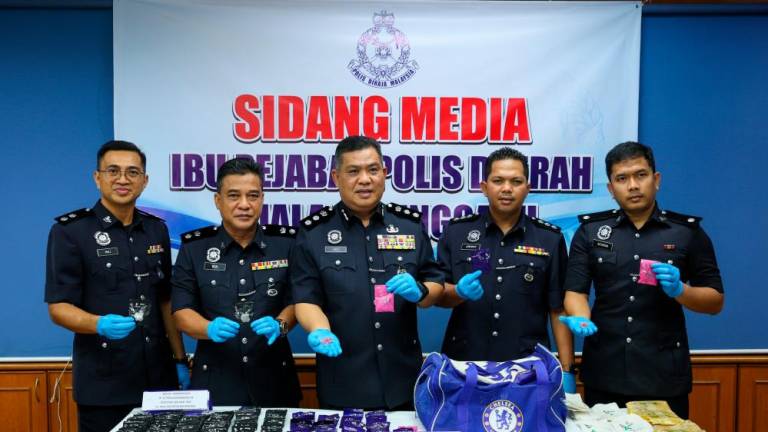THE Covid-19 virus has no moral conscience. It is happily multiplying in a conducive environment, while one half of the government is toiling away, the other half remains opaque, missing and in anonymity for the last 17 months.
There are 32 Cabinet ministers and 38 deputy ministers. For some reason, we are only familiar with the names and portfolios of the few ministers who make the news for the right reason. This is an opportunity for everyone to stand up, be counted and take the spotlight.
Right now, we are going through an unprecedented pandemic crisis. We need a whole-of-government and whole-of society approach to resolve hundreds of related issues. Every single day, people are looking towards the government to give them hope and confidence that normalcy will be restored.
Prime Minister Tan Sri Muhyiddin Yassin has allocated RM322.5 billion to manage the present crisis, boost our economic resilience and reinforce healthcare. This is the largest budget ever in the history of Malaysia.
Finance Minister Tengku Datuk Seri Zafrul Abdul Aziz said the generous budget was specifically designed to champion the cause of the vulnerable groups who are currently facing difficulties. To do this, the government needs every single person in the Cabinet, their resources and their staff to design effective channels and tools to ensure this money reaches every nook and corner of the needy in Malaysia.
Given the large budget, any Malaysian who starves or goes hungry is a symptom of a failed delivery system. However, despite the huge budgets and resources, some ministers have not even made a single statement on how their ministry is specifically addressing this pandemic – on its own.
For instance, the ministry responsible for the welfare of the community and has massive data, statistical and welfare literacy with direct access to the underprivileged. This is the time to use all its resources and play a pivotal role.
In 2001, the then prime minister, Tun Dr Mahathir Mohamad, set up a tiny Women’s Affairs Ministry, with only four staff, and a faintly sketched direction. Within a few years, this ministry grew to a colossal size and addressed a varied spectrum of issues ranging from children, women, senior citizens to victims of natural disaster.
In each category of the above issues, the then minister Tan Sri Shahrizat Jalil took a central role, “it’s my ministry’s problem” responsibility and integrated with other ministries’ resources to resolve problems, like natural disasters issues of yearly massive floods.
In just a few years, the ministry was redefined as the Ministry of Women, Family and Community Development, while it merged with the Welfare Ministry. The ministry kept growing, with sprawling new departments, institutions, welfare homes, creches, now with a massive almost 10,000 staff.
During Shahrizat’s tenure, Malaysia hosted the first Non-Aligned Movement Women Ministerial Meeting, attended by ministers from all over the world and produced the Nam Putrajaya Declaration, for international point of reference.
Following that, the Nam Institute for the Empowerment of Women headquarters, in Kuala Lumpur, was set up to develop partnerships with all member countries. The list is endless. The ministry grew, was relevant and was internationally visible. It is the minister who makes things happen.
Khairy Jamaluddin, the minister of Science, Technology and Innovation, runs a small ministry, with the lowest budget in the government. The prime minister appointed Khairy as the coordinating minister for the National Covid-19 Immunisation Programme. He worked innovatively and diligently, procured vaccines and speedily delivered it to well-facilitated vaccination centres.
The rapid vaccination of the population presented a spectrum of challenges, from production to distribution, deployment and importantly, acceptance. As I write this, 19 million people have registered for vaccines and more than 10 million have received their first dose. So far, the process has been visibly efficient.
One of the biggest hurdles, all over the world, has been in convincing and building trust that vaccines indeed work. No one in the world was prepared for this pandemic. Yet, with conscientious planning, other countries have turned this situation around. These are extraordinary times that call for extraordinary sacrifices.
Our frontliners face daily threats of death, and yet they are not missing in action. They turn up. As you can tell, many ministers could play an individualistic, prominent role, without being told so. Covid-19 should not be an excuse for government departments and agencies not to be fully operational – it should be the very reason for them to go beyond the call of duty. This can only happen if the ministers understand the full depth and range of the trauma, the chaos and, above all, the indignity that people are being subjected to.
The Covid-19 virus will take a gracious bow and leave us at some point. But the future generation will never forgive us if the situation gets any worse.
Vasanthi Ramachandran is an author, brand strategist and runs Helping Hands.
Comments: letters@thesundaily.com













